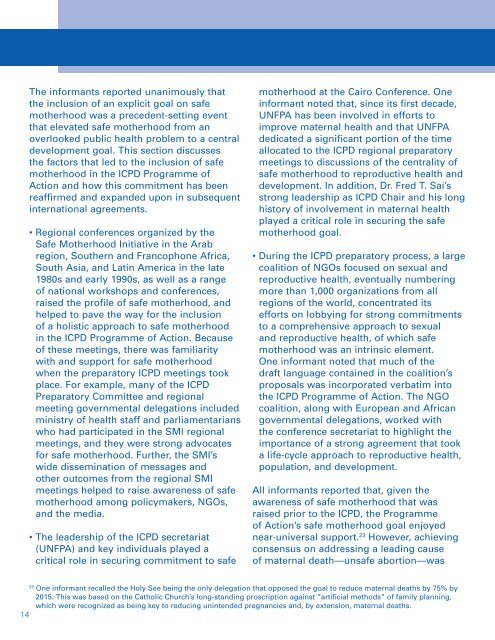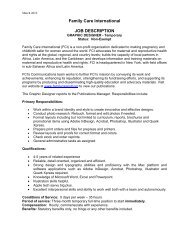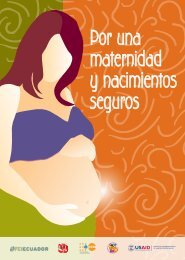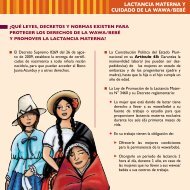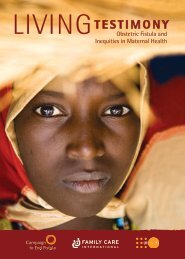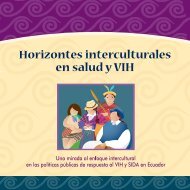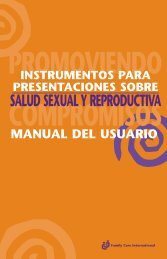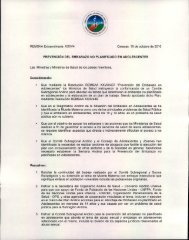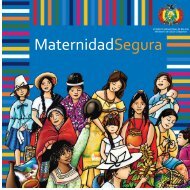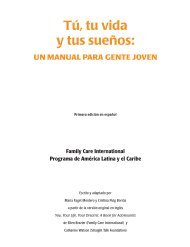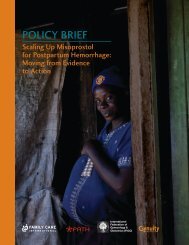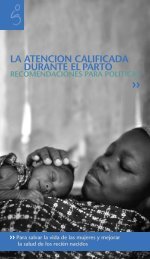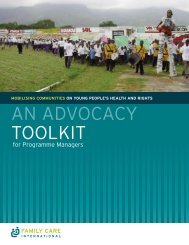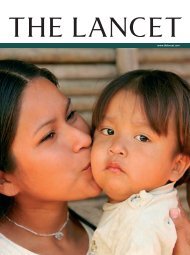Safe Motherhood: A Review - Family Care International
Safe Motherhood: A Review - Family Care International
Safe Motherhood: A Review - Family Care International
You also want an ePaper? Increase the reach of your titles
YUMPU automatically turns print PDFs into web optimized ePapers that Google loves.
1<br />
The informants reported unanimously that<br />
the inclusion of an explicit goal on safe<br />
motherhood was a precedent-setting event<br />
that elevated safe motherhood from an<br />
overlooked public health problem to a central<br />
development goal. This section discusses<br />
the factors that led to the inclusion of safe<br />
motherhood in the ICPD Programme of<br />
Action and how this commitment has been<br />
reaffirmed and expanded upon in subsequent<br />
international agreements.<br />
• Regional conferences organized by the<br />
<strong>Safe</strong> <strong>Motherhood</strong> Initiative in the Arab<br />
region, Southern and Francophone Africa,<br />
South Asia, and Latin America in the late<br />
1980s and early 1990s, as well as a range<br />
of national workshops and conferences,<br />
raised the profile of safe motherhood, and<br />
helped to pave the way for the inclusion<br />
of a holistic approach to safe motherhood<br />
in the ICPD Programme of Action. Because<br />
of these meetings, there was familiarity<br />
with and support for safe motherhood<br />
when the preparatory ICPD meetings took<br />
place. For example, many of the ICPD<br />
Preparatory Committee and regional<br />
meeting governmental delegations included<br />
ministry of health staff and parliamentarians<br />
who had participated in the SMI regional<br />
meetings, and they were strong advocates<br />
for safe motherhood. Further, the SMI’s<br />
wide dissemination of messages and<br />
other outcomes from the regional SMI<br />
meetings helped to raise awareness of safe<br />
motherhood among policymakers, NGOs,<br />
and the media.<br />
• The leadership of the ICPD secretariat<br />
(UNFPA) and key individuals played a<br />
critical role in securing commitment to safe<br />
motherhood at the Cairo Conference. One<br />
informant noted that, since its first decade,<br />
UNFPA has been involved in efforts to<br />
improve maternal health and that UNFPA<br />
dedicated a significant portion of the time<br />
allocated to the ICPD regional preparatory<br />
meetings to discussions of the centrality of<br />
safe motherhood to reproductive health and<br />
development. In addition, Dr. Fred T. Sai’s<br />
strong leadership as ICPD Chair and his long<br />
history of involvement in maternal health<br />
played a critical role in securing the safe<br />
motherhood goal.<br />
• During the ICPD preparatory process, a large<br />
coalition of NGOs focused on sexual and<br />
reproductive health, eventually numbering<br />
more than 1,000 organizations from all<br />
regions of the world, concentrated its<br />
efforts on lobbying for strong commitments<br />
to a comprehensive approach to sexual<br />
and reproductive health, of which safe<br />
motherhood was an intrinsic element.<br />
One informant noted that much of the<br />
draft language contained in the coalition’s<br />
proposals was incorporated verbatim into<br />
the ICPD Programme of Action. The NGO<br />
coalition, along with European and African<br />
governmental delegations, worked with<br />
the conference secretariat to highlight the<br />
importance of a strong agreement that took<br />
a life-cycle approach to reproductive health,<br />
population, and development.<br />
All informants reported that, given the<br />
awareness of safe motherhood that was<br />
raised prior to the ICPD, the Programme<br />
of Action’s safe motherhood goal enjoyed<br />
near-universal support. 23 However, achieving<br />
consensus on addressing a leading cause<br />
of maternal death—unsafe abortion—was<br />
23 One informant recalled the Holy See being the only delegation that opposed the goal to reduce maternal deaths by 75% by<br />
2015. This was based on the Catholic Church’s long-standing proscription against “artificial methods” of family planning,<br />
which were recognized as being key to reducing unintended pregnancies and, by extension, maternal deaths.


